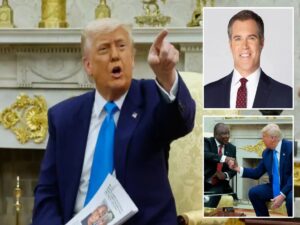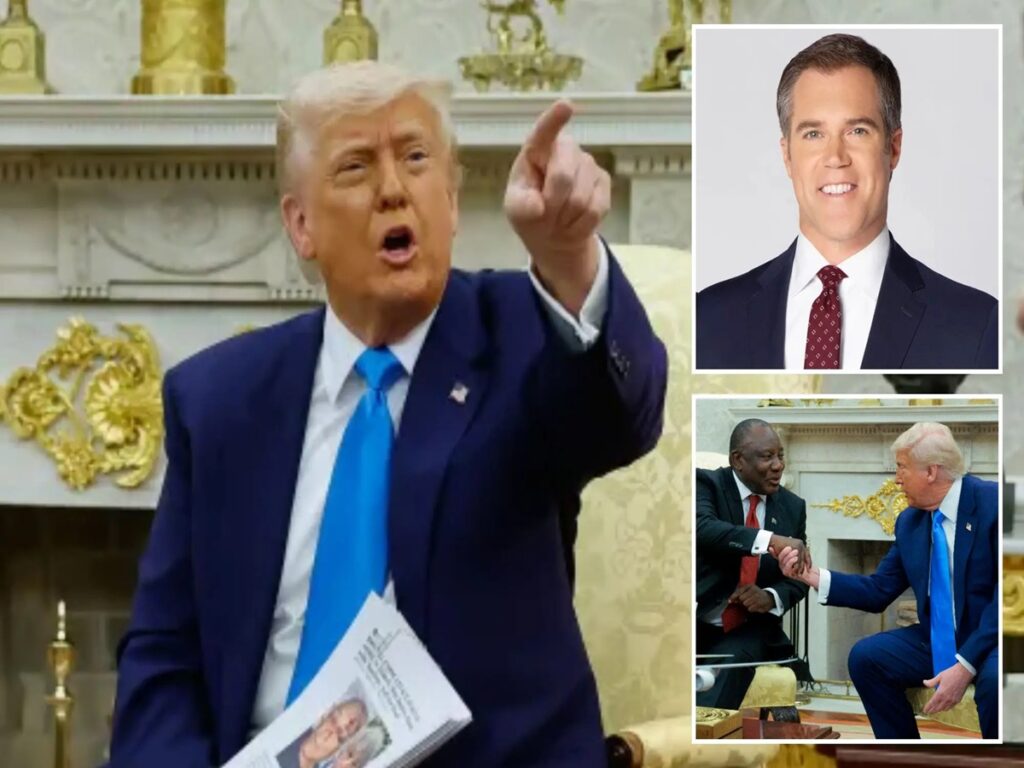On May 21, 2025, a routine Oval Office press conference turned volatile when Donald Trump exploded at NBC’s Peter Alexander over a question about a $400 million Qatari jet designated as a backup Air Force One. What followed wasn’t just another media clash—it exposed the deeper battle Trump continues to wage against press accountability.
1. The Oval Office Outburst
President Donald Trump was hosting South African President Cyril Ramaphosa in the Oval Office, intending to spotlight alleged violence against white farmers in South Africa. But the press briefing took an unexpected turn when NBC’s chief White House correspondent, Peter Alexander, asked a straightforward question: “Mr. President, the Department of Defense announced it would accept a Qatari jet to be used as Air Force One. Can you explain the decision?” Trump’s response was explosive. “What are you talking about? You ought to get out of here. You’re a terrible reporter. You’re not smart enough!” he lashed out, before further accusing NBC’s leadership of misconduct. The intensity of Trump’s anger over a simple question stunned the room—and it wasn’t the first time he’d used such tactics to deflect from controversy.
2. The Jet That Sparked the Firestorm
The object at the center of this clash was a $400 million Boeing 747 offered by the Qatari government as a backup Air Force One. Though framed as a government-to-government gesture, many questioned the legality and implications of accepting such a gift. Critics raised concerns over the U.S. Constitution’s Emoluments Clause, which prohibits federal officials from receiving gifts from foreign governments without congressional consent. Ethics watchdogs speculated that the plane might eventually be used for Trump’s presidential library, suggesting a veiled personal benefit. Others flagged espionage risks, noting the potential for surveillance technology embedded in a foreign-supplied aircraft. Even Trump’s own ideological allies, like Ben Shapiro and Laura Loomer, questioned the decision, with Loomer calling it a “potential bribe.”
3. A Pattern of Press Attacks
Trump’s attack on Alexander wasn’t isolated—it was part of a long-running pattern of hostility toward the press. During his presidency and after, Trump regularly dismissed unfavorable coverage as “fake news” and targeted reporters personally. He previously called Peter Alexander a “terrible reporter” during a COVID-19 briefing in 2020. He revoked CNN’s Jim Acosta’s press pass in 2018 after a heated exchange. Kaitlan Collins and Rachel Scott were also publicly insulted by Trump for simply asking tough questions. This strategy was consistent: insult the journalist, threaten the network, and deflect the subject—shifting attention from legitimate scrutiny to personal theatrics.
4. The Real Reason Trump Lost His Cool
Why did Trump erupt so violently over a question about a plane? The answer lies in the press conference’s original purpose and Trump’s need for message control. The Oval Office appearance was designed to push Trump’s controversial narrative of “white genocide” in South Africa. The Qatar jet question threatened to derail that message and invite scrutiny over a complicated issue involving ethics, foreign influence, and national security. Trump’s instinct was to shut it down immediately. Instead of engaging, he employed his well-worn tactic: discredit the reporter, dominate the room, and shift the focus. His goal wasn’t just to silence Alexander—it was to discourage any journalist from following up.
5. The Danger to Democracy
Trump’s behavior has implications far beyond a single press spat. The freedom of the press is a foundational element of American democracy, enshrined in the First Amendment. When political leaders use intimidation and humiliation to avoid accountability, they create a chilling effect. Journalists may begin to self-censor, and media organizations may shy away from hard-hitting stories. Public trust in the press has already eroded sharply, in part due to relentless claims of “fake news.” When leaders like Trump silence uncomfortable questions with rage and spectacle, it sends a signal not just to reporters—but to the public—that some truths are off limits.
6. Journalism Under Fire, Truth Unanswered
Peter Alexander’s question was entirely appropriate. The Qatar jet deal involves serious questions about legality, national security, and ethics. But Trump never answered it. Instead, his outburst buried the issue in a flood of insults, leaving the American people with no clarity about why the plane was accepted or what its implications are. This wasn’t just a story about a jet—it was a story about power, control, and the role of journalism in democracy. If reporters like Alexander are silenced, who will hold leaders accountable? As Congress considers whether to investigate the jet deal and NBC weighs whether to stand by its correspondent, one thing is clear: the war on the press didn’t end with Trump’s presidency—it may only be escalating.



